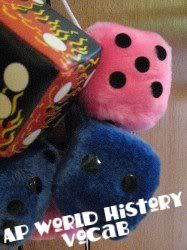CHAPTER 33 VOCAB
15 words
third world (813)
Also known as developing nations; nations outside the capitalist industrial nations of the first world and the industrialized communist nations of the second world; generally less economically powerful, but with varied economies.
PRI (816)
Party of the Institutionalized Revolution; dominant political party in Mexico; developed during the 1920s and 1930s; incorporated labor, peasant, military, and middle-class sectors; controlled other political organizations in Mexico.
Zapatistas (816)
Guerrilla movement named in honor of Emiliano Zapata; originated in 1994 in Mexico’s southern state of Chiapas; government responded with a combination of repression and negotiation.
Juan José Arevalo (819)
Elected president of Guatemala in 1944; began series of socialist reforms including land reform; nationalist program directed against foreign-owned companies such as United Fruit Company.
United Fruit Company (819)
Most important foreign economic concern in Guatemala during the 20th century; attempted land reform aimed at United Fruit caused U.S. intervention in Guatemalan politics leading to ouster of reform government in 1954.
Fulgencio Batista (819)
Dictator of Cuba from 1934 to 1944; returned to presidency in 1952; ousted from government by revolution led by Fidel Castro.
Fidel Castro (820)
Cuban revolutionary; overthrew dictator Fulgencio Batista in 1958; initiated series of socialist reforms; came to depend almost exclusively on Soviet Untion.
Ernesto “Che” Guevara (820)
Argentine revolutionary; aided Fidel Castro in overthrow of Fulgencio Batista regime in Cuba; died while directing guerrilla movement in Bolivia in 1967.
liberation theology (821)
Combined Catholic theology and socialist principles in effort to bring about improved conditions for the poor in Latin America in 20th century.
Salvador Allende (823)
President of Chile; nationalized industries and banks; sponsored peasant and worker expropriations of lands and foreign-owned factories; overthrown in 1973 by revolt of Chilean military with the support of the United States.
Sandinista party (824)
Nicaraguan socialist movement named after Augusto Sandino; successfully carried out a socialist revolution in Nicaragua during the 1980s.
Augusto Sandino (825)
Led a guerrilla resistance movement against U.S. occupation forces in Nicaragua; assassinated by Nicaraguan National Guard in 1934; became national hero and symbol of resistance to U.S. influence in Central America.
banana republics (825)
Term given to governments supported or created by the United States in Central America; believed to be either corrupt or subservient to U.S. interests.
Good Neighbor Policy (826)
Established by Franklin D. Roosevelt for dealing with Latin America in 1933; intended to halt direct intervention in Latin American politics.
Alliance for Progress (826)
Begun in 1961 by the United States to develop Latin America as an alternative to radical political solutions; enjoyed only limited success; failure of development programs led to renewal of direct intervention.
Etc. notes:
Google's Quote of the Day service spits this out at me. Propitious? I dunno.
"Disobedience, in the eyes of anyone who has read history, is man's original virtue. It is through disobedience and rebellion that progress has been made."
- Oscar Wilde.


No comments:
Post a Comment